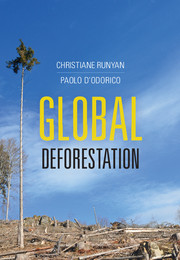Book contents
6 - Synthesis and Future Impacts of Deforestation
Published online by Cambridge University Press: 05 April 2016
Summary
Benefits of Preserving Forests
Forests provide an expansive range of environmental benefits (Table 5.2) that have local to regional (e.g., flood control) and global (e.g., carbon sequestration) relevance (Foley et al., 2007). Hydrological benefits of forests include regulating water supply and river discharge (i.e., moderating high and low flows) by increased transpiration, water storage beneath the forest, and increased travel time for water to reach streams/rivers. Climate benefits of forests include maintaining available precipitation via precipitation recycling (in areas where this feedback exists) and regulating local and global temperature both directly – by reducing diurnal sensible heat fluxes and nocturnal radiative cooling – and indirectly − by taking up atmospheric CO2 during photosynthesis. For instance, a review by Lawrence and Vandecar (2015) highlighted that complete deforestation of the tropics would lead to a 0.1–1.3°C increase in temperature across the tropics and drying of approximately –270 mm yr–1 (or up to 10%–15% decrease of annual rainfall). The presence of forests can also affect edaphic processes by reducing soil erosion and enhancing soil formation. Biogeochemical benefits of forests include enhancing nutrient availability and reducing nutrient losses, thereby increasing the amount of nutrients available for plant uptake and aiding in sustaining forest growth. Forests also provide many ecological services such as maintaining biodiversity and regulating a range of dynamical trophic relationships. As discussed in Chapter 4, forests can be important for maintaining their own habitat, possibly reducing the occurrence of disturbances such as fire or landsliding, and, in turn, maintaining the wide span of benefits described previously. Forests provide many economic benefits to societies from nontimber forest products (NTFPs) that are harvested from them. These NTFPs provide food (e.g., nuts, honey, bush meat, and fruits), medicine, construction materials (e.g., rubber), bioprospecting (i.e., value for new pharmaceutical products), and agricultural products such as fodder for livestock. Forests also have recreation, cultural, intellectual, aesthetic, and spiritual values that are important to society. Thus, deforestation strongly affects the environment and society. In the following sections we review and summarize some of its major impacts.
Ecohydrological and Climate Impacts of Deforestation
Most of the past research on the hydrological impacts of deforestation has focused on changes in water yields and flow regulation. The removal of forest vegetation causes a reduction in soil infiltration and evapotranspiration and, consequently, an increase in infiltration-excess runoff and soil erosion.
- Type
- Chapter
- Information
- Global Deforestation , pp. 173 - 194Publisher: Cambridge University PressPrint publication year: 2016



